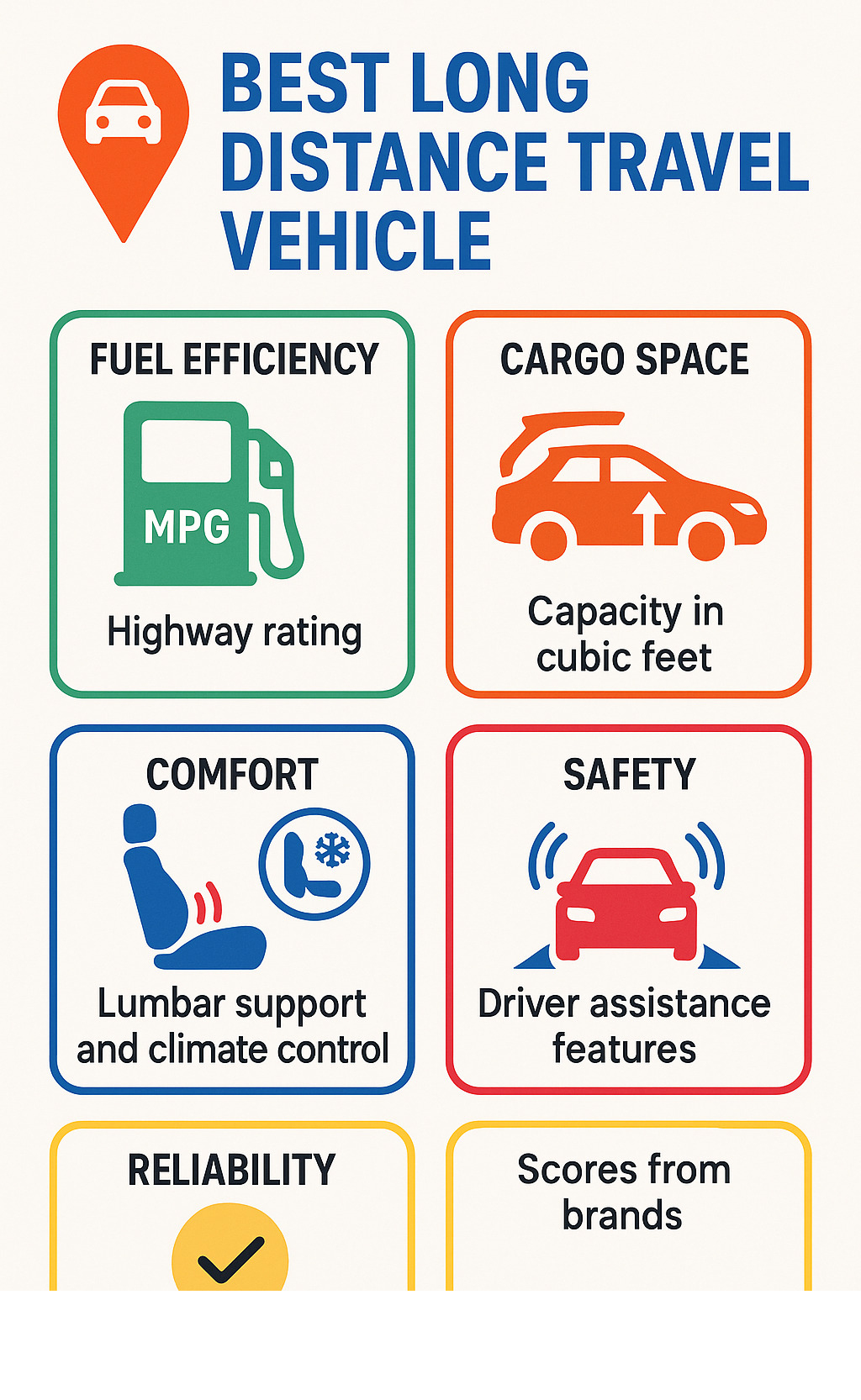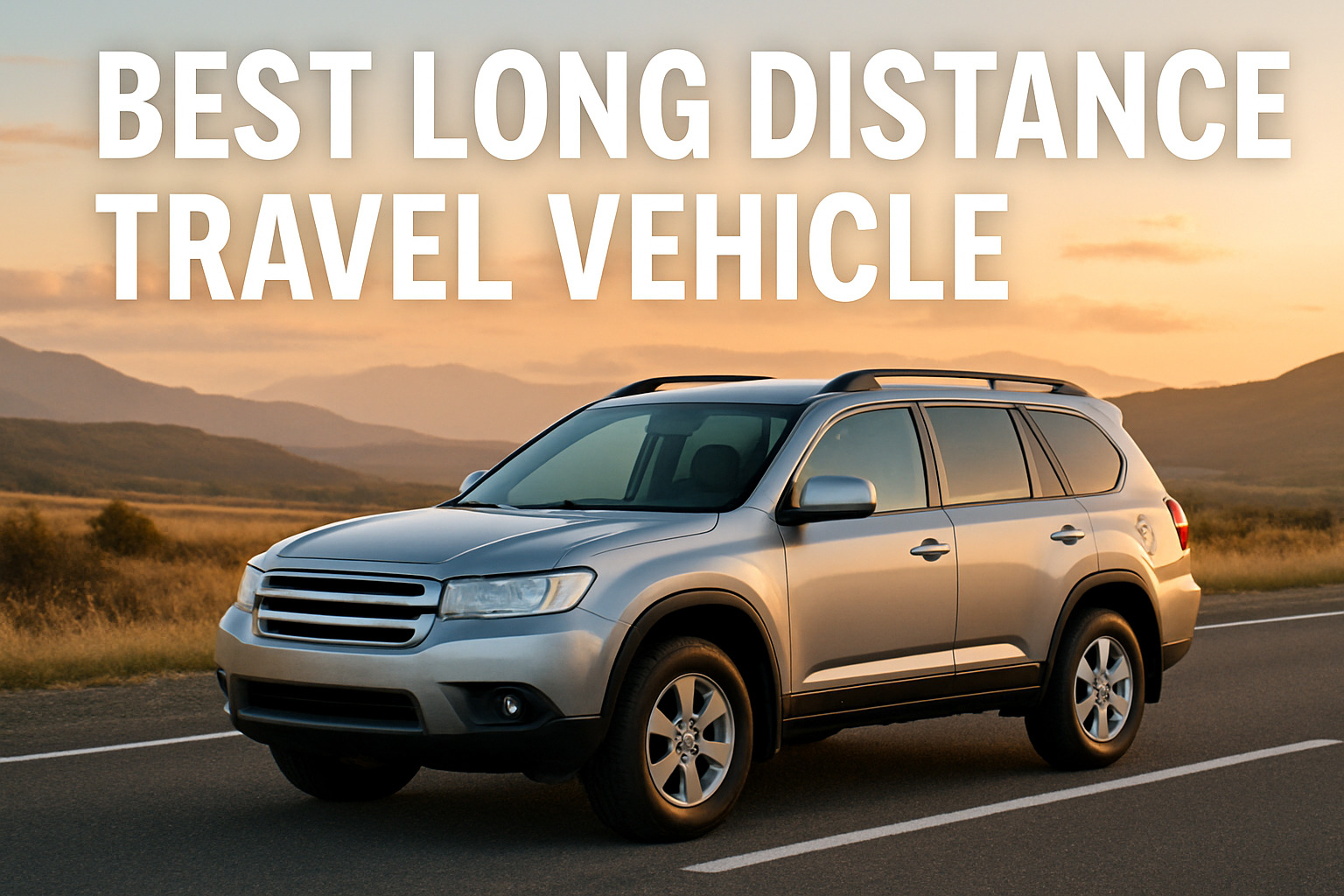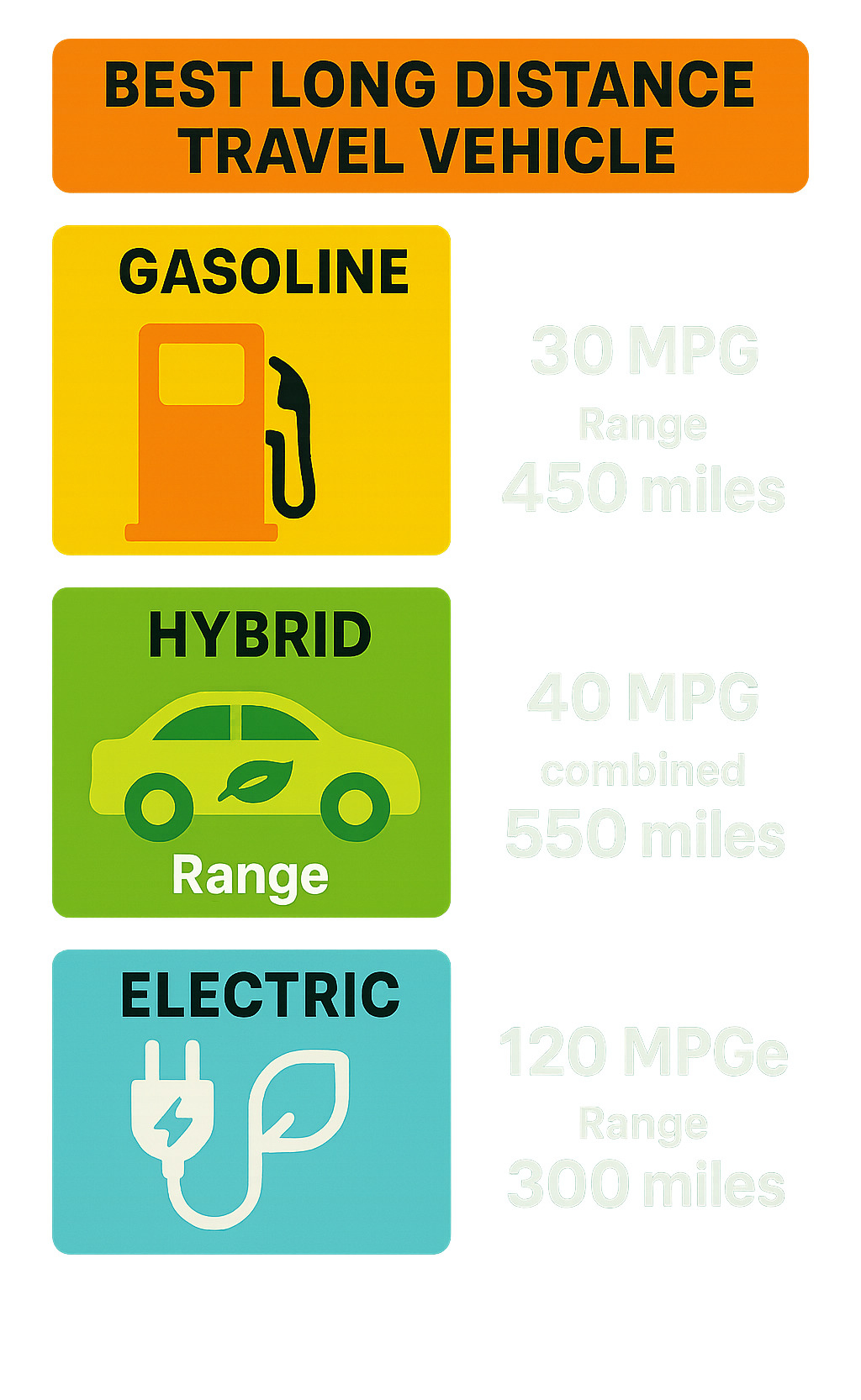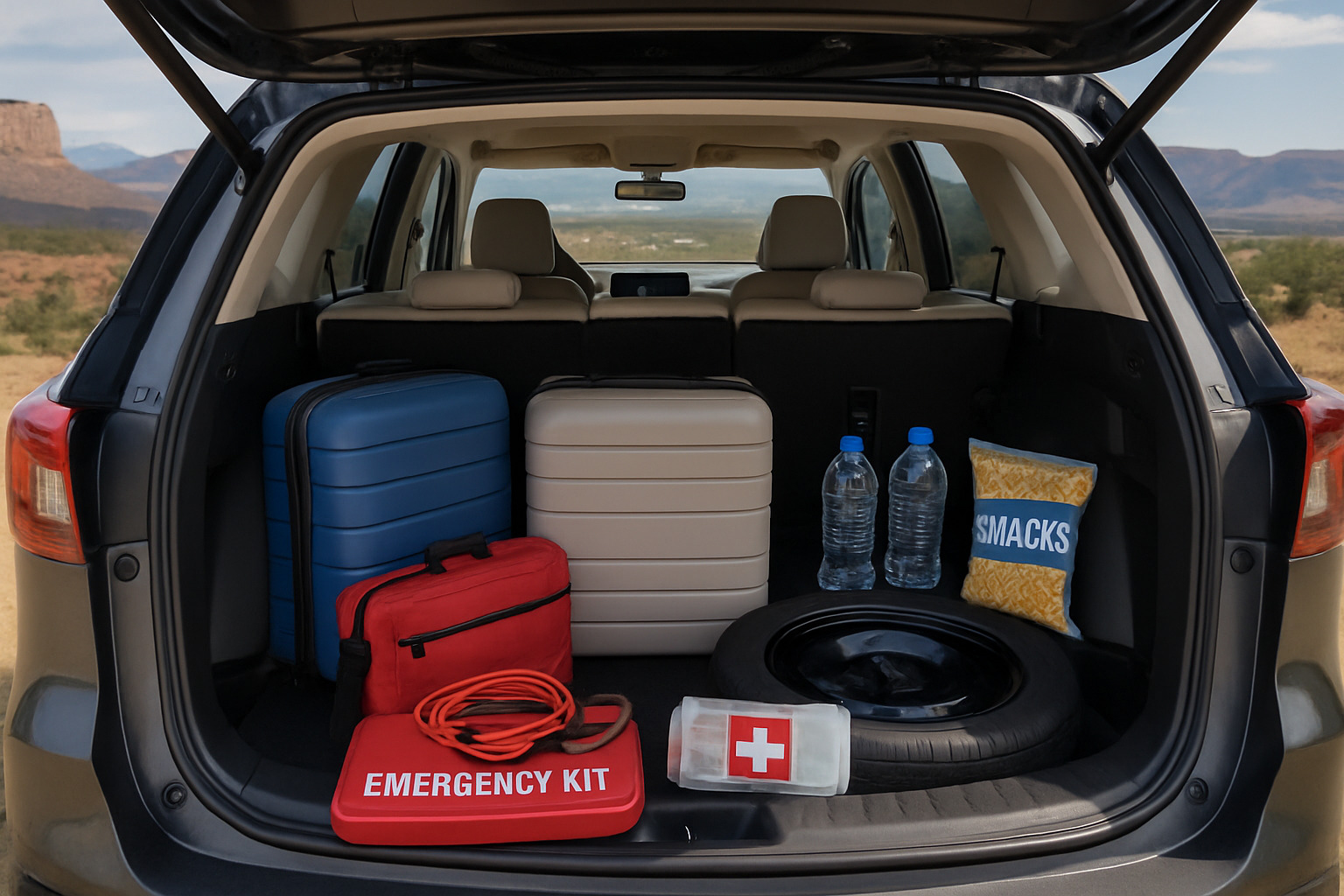Best Long Distance Travel Vehicle: Top 10 Reliable Picks 2025
Why Choosing the Right Long-Distance Travel Vehicle Matters
The best long distance travel vehicle combines comfort, fuel efficiency, and reliability to turn marathon drives into enjoyable journeys. Here are the top picks across different categories:
Top Long-Distance Travel Vehicles:
– Sedans: Honda Accord Hybrid (41 mpg highway), Mercedes E-Class E 220 d (59 mpg)
– SUVs: Honda CR-V Hybrid (43 mpg combined), Subaru Outback (75.7 cu ft cargo space)
– Minivans: Toyota Sienna Hybrid (36 mpg highway, 648-mile range), Chrysler Pacifica Hybrid (30 mpg combined)
– Trucks: Ram 1500 (11,580 lbs towing capacity), Chevrolet Suburban (8,000+ lbs towing)
– Electric: Tesla Model 3 Long Range (390 miles range), BMW i5 eDrive40 (357 miles range)
Modern long-distance travel demands more than just getting there. You need a vehicle that keeps you comfortable during 8-hour driving days, sips fuel efficiently to control costs, and provides enough cargo space for everything from camping gear to pet crates.

Key best long distance travel vehicle vocabulary:
– are compact rental cars good for road trips
– good rental cars for road trips
– kia carnival
Why the Right Vehicle Matters
Driver fatigue isn’t just uncomfortable – it’s dangerous. Poor lumbar support leads to back pain, excessive road noise causes stress, and inadequate legroom creates circulation problems. A vehicle that gets 20 mpg versus 40 mpg can cost hundreds more in fuel on a cross-country trip. Reliability becomes a financial necessity when you factor in potential roadside repairs and towing costs.
What Makes a Vehicle “Long-Distance Ready”?
A truly best long distance travel vehicle needs to excel in several key areas. Comfort ergonomics form the foundation – your seats become your home base for hours at a time, so they need proper lumbar support and multiple adjustment points.
Fuel efficiency directly impacts both your wallet and sanity. The Honda CR-V Hybrid delivers 43 mpg combined, while the Toyota Sienna Hybrid’s 648-mile range means fewer stops and more focus on scenery.
Cargo flexibility becomes essential when packing camping gear to souvenirs. The Subaru Outback’s 75.7 cubic feet of cargo space shows how smart design accommodates almost anything.
Advanced safety features reduce driver fatigue. Adaptive cruise control handles speed adjustments, while lane-keeping assist prevents drifting during long highway stretches.
Key Shopping Factors
Seating support goes beyond comfort – you need adjustable lumbar support and side bolsters that maintain their shape after hours of use. Suspension tuning filters out road imperfections that cause fatigue over hundreds of miles.
Infotainment systems with wireless smartphone integration and multiple USB-C ports keep everyone connected. Insurance impact varies dramatically – luxury SUVs might cost $161-$373 monthly while practical choices like the Honda CR-V Hybrid average just $10-$81 monthly.
For vehicle camping modifications, see our Automobile Camping guide.
The Best Long Distance Travel Vehicle by Body Style
Finding the best long distance travel vehicle depends on your specific travel needs. Sedans deliver incredible fuel economy, SUVs offer cargo space and commanding views, while minivans maximize family comfort.
Sedans & Wagons for Highway Dominance
The Honda Accord Hybrid proves practical doesn’t mean boring with 41 mpg highway and spacious interior comfort. The Mercedes E-Class E 220 d sets the luxury standard with 59 mpg diesel efficiency and library-quiet cabins.
The Volvo V90 Cross Country offers 29 mpg with raised ride height for better visibility, while the Skoda Superb delivers 57.7 mpg with exceptional rear-seat comfort.
Compact & Midsize SUVs for Versatility
The Honda CR-V Hybrid deserves its popularity with 43 mpg combined and 75.8 cubic feet of cargo space. The Subaru Outback provides standard all-wheel drive confidence with 75.7 cubic feet of storage.
The Kia Telluride achieves 28 mpg highway while seating adults comfortably in all three rows. The Toyota Land Cruiser brings legendary reliability at 23 mpg combined.
For detailed comparisons, check our Best Compact SUV for Road Trips guide.
Minivans & Family Haulers
The Toyota Sienna Hybrid changes the game with 36 mpg highway and 648-mile range. Eight-passenger seating and sliding doors make family travel genuinely easier.
The Chrysler Pacifica Hybrid brings plug-in capability at 30 mpg combined, while the Kia Carnival addresses minivan stigma with SUV-like styling at $33,600.
Pickups & Trip Vehicles
The Ram 1500 balances capability with efficiency, offering 11,580 pounds of towing capacity. The Chevrolet Suburban seats nine while maintaining 8,000+ pounds of towing capacity at 22 mpg combined.
Diesel engines provide superior torque and often achieve better highway economy than gasoline equivalents.
For specialized vehicles, explore our Best Overland Vehicles guide.
Electric & Plug-In Options
The Tesla Model 3 Long Range provides 390 miles of range with access to Tesla’s extensive Boostr network. The BMW i5 eDrive40 offers 357 miles of range with 205kW fast charging.
The Mazda CX-70 PHEV represents the plug-in hybrid sweet spot with 26 miles of electric range plus hybrid efficiency for longer trips.

Comfort Tech & Seating Science for Marathon Miles
Your body wasn’t designed to sit for eight hours straight. The best long distance travel vehicle needs seats and technology that work with your body, not against it.
Lumbar support prevents lower back pain that ruins road trips. Massaging seats in vehicles like the Genesis G90 keep blood flowing and muscles relaxed. Cabin noise reduction prevents mental fatigue – the Mercedes E-Class creates library-quiet environments.
Climate control systems maintain consistent temperature and humidity to prevent drowsiness. Modern connectivity features keep everyone engaged with wireless smartphone integration and Wi-Fi hotspots.
How Seating Layout Influences Fatigue
Captain’s chairs provide individual armrests and better support than bench seats. Leg-room metrics become critical – your legs need space to shift positions and maintain blood flow. Recline angles allow passengers to find comfortable positions for sleeping or relaxing.
Infotainment & Connectivity Must-Haves
Wi-Fi hotspots keep passengers connected without burning smartphone data. USB-C ports throughout the cabin ensure devices stay charged. Over-the-air updates continuously improve functionality without dealership visits.
For comprehensive recommendations, check our Best Cars for Road Trips guide.
Range, Efficiency & Powertrain Choices
Choosing the right powertrain for your best long distance travel vehicle makes the difference between relaxing journeys and stressful fuel stops.
The Honda Accord Hybrid’s 41 mpg highway translates to excellent range, while the BMW i5 uses 28 kWh per 100 miles. Tank size often matters more than pure efficiency – the Toyota Sienna Hybrid’s 648-mile range means Chicago to Denver with just one fuel stop.

Gasoline & Diesel Long-Range Masters
A Ram 2500 Cummins with 20 mpg highway can cover over 500 miles between stops. The Mercedes E-Class E 220 d achieves 59 mpg highway while providing luxury comfort. Diesel torque makes highway driving effortless with smooth, quiet cruising.
Hybrid & Plug-In Sweet Spots
The Mazda CX-70 PHEV offers 26 miles of electric-only driving for local exploration. Tax incentives make plug-in hybrids attractive with federal and state rebates. The Honda CR-V Hybrid’s 43 mpg combined stays consistent across varying driving conditions.
Pure-EV Marathoners
Tesla’s Boostr network offers reliable coverage with consistent charging speeds. The BMW i5 maintains high charging speeds longer than competitors. Cold weather can reduce range 20-30%, so winter trips need extra charging buffer.
Safety, Reliability & Total Cost of Ownership
When cruising endless highways, safety features and reliability become your lifeline. Driver assistance systems transform exhausting marathons into manageable journeys.
Adaptive cruise control handles constant speed adjustments, while lane-keeping assist prevents drifting when attention wavers. These systems reduce mental workload that leads to driver fatigue.
Warranty coverage becomes your financial safety net 500 miles from home. Insurance costs vary dramatically – the Honda CR-V Hybrid’s $10-$81 monthly cost leaves more for travel, while luxury SUVs can cost $300+ monthly.
For daily highway use, see our Best Car for Long Highway Commute guide.
Must-Have Driver-Assist Features
Blind-spot monitoring becomes essential on unfamiliar routes when spatial awareness decreases. Fatigue detection monitors steering patterns and recommends rest stops. 360-degree cameras prevent costly scrapes when parking large vehicles.
Reliability & Maintenance Economics
Mainstream brands like Toyota, Honda, and Ford consistently outperform luxury manufacturers. Volume brands produce four times more vehicles than luxury brands, meaning better parts availability and more service locations. Simplicity favors straightforward designs over complex systems for long-distance reliability.
Preparing Your Vehicle for a Cross-Country Journey
Preparing your vehicle for cross-country travel is like training for a marathon. The right preparation prevents roadside nightmares.
Pre-trip inspection starts with basics: check all fluid levels, inspect belts for cracking, and ensure battery terminals are clean. Tire inspection deserves special attention – use the penny test for tread depth and check for unusual wear patterns.
Emergency kits should match your route. Include basic tools, jumper cables, tire repair supplies, first aid materials, and portable phone chargers. Route planning applications provide real-time fuel stops and traffic information.

Packing & Cargo Hacks
Roof boxes expand cargo capacity without sacrificing interior space. Load lightweight, bulky items on top and keep heavy items inside. Modular storage systems prevent items from becoming projectiles during sudden stops.
Pet accommodations require proper restraint systems and regular exercise stops. Never leave pets unattended in vehicles.
Keeping Costs in Check on the Road
Fuel applications like GasBuddy identify lowest prices along your route. Off-peak charging for EVs can significantly reduce electricity costs. Loyalty programs from fuel companies and charging networks provide substantial savings over multiple trips.
Frequently Asked Questions about the Best Long Distance Travel Vehicle
How important is fuel efficiency versus comfort on 1,000-mile trips?
Both factors matter significantly. For occasional trips, comfort features like supportive seating might justify lower fuel economy. But for regular travelers, efficiency directly impacts costs – the difference between 20 mpg versus 40 mpg can cost hundreds on cross-country trips.
The good news? Modern vehicles like the Honda CR-V Hybrid deliver 43 mpg combined while offering excellent comfort. The Toyota Sienna Hybrid proves this balance with 36 mpg highway, comfortable seating for eight, and 648-mile range.
Are electric vehicles practical when charging stations are sparse?
Tesla vehicles offer the most practical long-distance experience thanks to their extensive Boostr network. The Model 3 Long Range’s 390-mile range handles most daily segments between charging stops.
Other EVs are catching up – the BMW i5 eDrive40 offers 357 miles of range with 30-minute fast charging. However, route planning becomes essential in ways gas cars never required.
For remote areas, plug-in hybrids like the Mazda CX-70 PHEV offer the best compromise with 26 miles of electric range plus gasoline backup.
What driver-assist feature reduces fatigue the most?
Adaptive cruise control with stop-and-go capability stands out as the most fatigue-reducing technology. It eliminates constant minor speed adjustments that accumulate mental fatigue over hundreds of miles.
Lane-keeping assist ranks second by handling micro-corrections to stay centered. When these systems work together, they can handle much of the routine highway workload, resulting in noticeably less fatigue.
Conclusion
Finding the best long distance travel vehicle comes down to understanding your specific needs. Whether it’s the Honda Accord Hybrid’s 41 mpg efficiency, the Subaru Outback’s 75.7 cubic feet of cargo space, or the Toyota Sienna Hybrid’s 648-mile range, today’s vehicles blend comfort and efficiency like never before.
The perfect long-distance vehicle isn’t about following recommendations – it’s about honest self-reflection. Do you need that third row, or would you prefer extra cargo space? Will you use that towing capacity, or are you paying for unused capability?
At Car News 4 You, we understand how automotive innovation intersects with real-world experiences. We know luxury isn’t just premium badges – it’s arriving refreshed instead of exhausted. Performance isn’t just horsepower – it’s reliable power delivery mile after mile.
The American road trip tradition continues evolving, but the core appeal remains: freedom, findy, and the journey being as important as the destination. When you choose the right vehicle, those long miles become opportunities to connect with family and create lasting memories.
Whether you’re drawn to electric efficiency, proven hybrid reliability, or go-anywhere SUV capability, the best long distance travel vehicle matches your travel dreams with practical reality.
Ready for specific recommendations? Our comprehensive Best Cars for Road Trips guide breaks down even more models to help you find your perfect travel companion. The right vehicle doesn’t just get you there – it makes every mile worth remembering.








1 thought on “Comfort Meets Mileage – Best Vehicles for Long Distance Travel”
Pingback: Hit the Road in Style – The Best SUVs for Your Next Trip - Car News 4 You
Comments are closed.